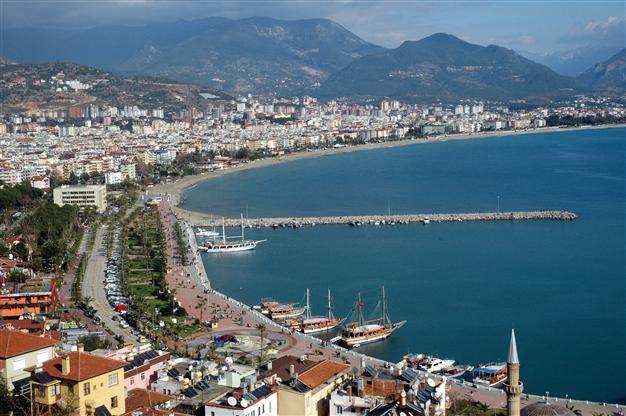Foreigners who pay can stay, say locals in Turkish town
ANTALYA - Doğan News Agency

Foreigners have purchased 20,000 houses in Alanya and its environs so far, but inadequate levels of communication with the locals will lead to conflict, says Baltacı.
Locals in the district of
Alanya in
Turkey’s Mediterranean province of Antalya harbor positive sentiments toward foreign residents in the area, based on the degree to which they contribute to their own income, a recent post-graduate thesis study has revealed.
The study, conducted by Furkan Baltacı, a research associate at Akdeniz University’s Alanya Faculty of Business Administration, also indicated that locals with higher levels of income and education tended to view foreign residents more favorably. Alanya locals with low-income levels who do not economically benefit from the presence of foreign residents, on the other hand, are inclined to feel apprehensive that foreign occupants could deform the social and cultural fabric of their society, the study found.
Alanya locals are generally pleased about the foreign residents who are living in the area, according to Baltacı. However, many feel anxious that increasing numbers of foreign residents could lead to a rise in missionary activities, the corruption of moral and cultural values and the possibility that foreigners could stake claims on Turkey.
Foreign nationals have purchased some 20,000 houses in Alanya and its environs so far, Baltacı said, adding that inadequate levels of communication would inevitably lead to conflict. Virtually all foreign residents are living in houses located in exclusive zones and refrain from buying flats in apartment buildings where Turkish locals reside, he said.
That foreign residents who live in exclusive housing areas tend to shop in stores opened by other foreigners also reduces their economic contribution to the area, Baltacı added.
Discrimination complaintsHe also pointed out that foreign residents frequently voice concerns about the fact that locals in vicinity of their houses are feeding farm animals, such as goats, cows and sheep. They also complain of discriminatory practices on certain issues. “For instance, when Turks are not required to pay any fees for cemeteries, while foreigners are required to pay for graves assigned to them it leads them to think that they are being discriminated against,” Baltacı said.
Well-to-do foreign residents boost inflation levels in their area. “Bananas are grown in Alanya. A kilogram of bananas cost 4 Turkish Liras in Mahmutlar where foreigners are most [heavily concentrated], whereas the same bananas can be purchased for 2.5 to 3 liras in Isparta.”
Foreigner occupants in Alanya can lead comfortable lives with retirement salaries of around 2,000 euros, whereas local pensioners do not possess the same means, thus fueling further unease, he said.
